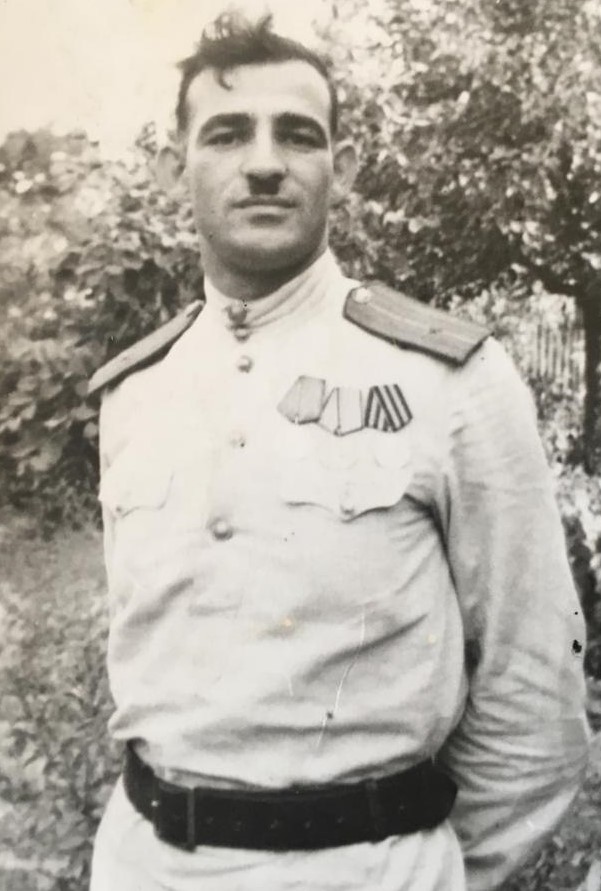Boris Ryvkin was born in 1920 in Klimovichi, eastern Belorussia, as Borekh-Tsodyk Ryvkin. His father Shmuel owned a hardware store, but in 1928 his business was nationalized by the Soviet authorities. Only the fact that the family had eight children saved Shmuel Ryvkin from the confiscation of all of his property, and possible deportation.
In 1939, Boris Ryvkin enrolled in the Leningrad Law Institute (later the Faculty of Law of St. Petersburg State University), and that same year he was drafted into the Red Army. He took part in the Soviet-Finnish (Winter) war of 1939-40, and was then transferred to the recently annexed Bessarabia (present-day Moldova), where he served on the new Soviet-Romanian border on the Pruth River. It was there that he first saw action in the Soviet-German War in June 1941. The Southwestern Front was in retreat. Ryvkin would later recall: "I saw the Germans bomb the Jewish quarters of Bălți [Bessarabia) from a low altitude; I heard what the Jewish refugees were telling about the Germans. I wrote to my relatives, urging them to flee from Klimovichi any way they could. But the postal service worked atrociously in those days" 1. Ryvkin's family failed to evacuate, and his parents and two younger brothers were shot by the Nazis.
During the retreat in southern Russia, Ryvkin was shell-shocked in an aerial bombardment. After being discharged from the hospital, he was transferred to the 213th Reserve Rifle Regiment, where, in 1942-43, he served at a training battalion, in the rank of senior sergeant. In July 1943, Ryvkin was transferred to the 18th Separate Regiment of the Officer Reserve, and was promoted to the rank of second lieutenant. From May to October 1944, he once again served at a training company, and then became the commander of a riflemen company of this regiment. He also served as the adjutant of Colonel Malykh, the commander of the 18th Regiment.
On August 31, 1944, the forces of the 3rd Ukrainian (former Southwestern) Front entered Bucharest. On September 26, the eve of Yom Kippur, Ryvkin asked his commander for permission to attend a synagogue. Along with an officer from another unit, a major, he walked into the synagogue. The sight of two Red Army officers in uniform almost caused panic among the worshippers. However, the rabbi was unfazed, and he handed tallits and prayer books to the two new arrivals. They were seated in the front row. After the end of the service, the rabbi held a speech, in which he turned to the two Soviet Jewish officers and said: Now, just like you have liberated Europe from the Nazis, you will fight for the Land of Israel. Someone began to photograph them with a flash (which is surely forbidden on Yom Kippur). Ryvkin recalls: "The major said: 'Farfalln' (Yiddish for [We are] lost!), but it was too late to be afraid" (from a conversation with Boris Ryvkin in 1987).
Ryvkin was discharged from the army in 1946. He returned to Leningrad, graduated from the Law Institute, and went on to work as a lawyer at various enterprises.
Boris Ryvkin died in Israel in 2009.
Additional Information
Being shell-shocked on the Southwestern Front
"Once, during lunchtime, we were sitting in a trench. Suddenly, seven 'Messerschmitts' appeared in the sky, and bombs began to fall on us, as though from a 'horn of plenty.' Boxes of cannon shells stood beside the trench, and they began to explode. The earth shook around us, it was a veritable doomsday. My lips involuntarily began to articulate the words of the prayer 'Shma Yisrael'. The deputy commander for political affairs [who lay] beside me cried: 'Tell me what I have to say!' And he began to yell: 'Shma Yisrael, shma Yisrael!' Our commissar was not Jewish. When the planes flew away, he asked me what these words meant.
The silence did not last long. The Messerschmidts came back to repeat their bombing. It was then that I was shell-shocked".
[Na voine kak na voine, Book 2, ed. Boris Pernikov. Petah-Tikva, 2006, p. 32]
From Boris Ryvkin's wartime memories
"Before the war, our family lived in Belorussia, in the town of Klimovichi. The Nazis 'solved the Jewish question' there, as they did elsewhere.… In November 1941, my mother, father, and two little brothers, aged ten and twelve, were killed. I knew nothing of the fate of my parents, and sent queries to various institutions. When I received the answer and learned of their deaths, I was filled with the desire for revenge, nothing but revenge. All the other aspects of my life paled into insignificance.
Therefore, General Malykh sent me into the rear, hoping that I would come to my senses. But my mood did not change in the three days I spent there. During the offensive, when we attacked, I walked on, my head held high; killed and wounded soldiers fell to the left and right of me; bullets whistled past me, but I walked on as though bewitched. After one such battle, my commander Baidabura told me: 'You will see the end of the war, you will survive'."
[Na voine kak na voine, Book 2, ed. Boris Pernikov. Petah-Tikva, 2006, p. 33]
- 1. [YVA O.3/4726]







